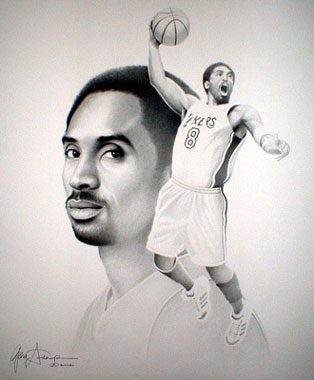
When showing stats or information about a player, TNT has added a video clip of the player in question, doing whatever they want to do while the talking heads get "inside the numbers", as the kids like to say. First of all, these clips are somewhat unsettling, at least for someone brought up with the static player photograph. Most of the players seem as ill at ease as the viewer, which shouldn't be surprising as these are non-actors who have 10-seconds to sell their personality.
The most natural of the players in these videos is, of course, The Diesel. Mugging and clowning, Shaq easily portrays the persona that has made him one of the most immediately accessible yet ultimately enigmatic figures in the history of The Association. More than perhaps any other player in the history of the game, Shaq knows how to manipulate his public image to his own advantage, to the point where the only people who actually dislike the guy are people who view Shaq as having been the real catalyst behind the Kobe-Shaq split-up, which would be a small minority by most reckonings.
Kobe's TNT clip also manages to present a capsule version of himself, although it is almost certainly unintentional. Pursing his lips and locking eyes with the camera, Kobe is a canonical example of somebody trying to look tough where the emphasis is on "trying" instead of "tough". Like his rap album, it's a gesture intended to convince people that Kobe fits into the "urban baller" model and proves conclusively that he does not.
The archetype that seems more applicable is that of "tortured genius" on the level of Van Gogh or Caravaggio. Brilliant, misunderstood and unsufferably arrogant, Kobe has pulled a Bowie-esque (David, not Sam) transformation in these playoffs, suddenly appearing to be the team-first conductor of traffic that the media had been saying he was incapable of being. This conception of Kobe is so deep-set that as soon as he was viewed as having "regressed" by scoring 50 in Game 6, the TNT analysts concluded that he had lost the Lakers the game by scoring too much. The rebuttal came from Phil Jax, who pointed out that if Kobe had made his final shot in regulation, people would be praising Kobe for his aggressiveness.
He is perfectly correct in saying this and it is worth pointing out that Kobe is one of the few (would be the only, if it weren't for Billups and strangely enough, Lebron (only when driving)) players in the league where you are surprised when he misses an important shot. "Surprised" may not be a strong enough word for it, because it feels as if you've fallen through a rip in reality, like something has gone horribly wrong on an existential scale. Which is silly considering that this event is statistically fairly regular, which still does not deny that that the feeling is there.
The consensus seems to be that Game 7 will be determined by which Kobe shows up: Gunner Kobe (Lakers lose) or Conductor Kobe (Lakers win). As clear-cut as that analysis might be given the earlier results in the series, any of those games also could have easily swung the other way. I don't believe that which role Kobe plays determines who will win or lose. I do believe that having Kobe involved makes just about any game worth watching and a Game 7 gives it the possibility of epicness, for either Kobe calling out his self-believed status of Better Than Jordan or for watching somebody incredibly talented fall short of their expectations. |







Comments on "Game 7, or How I Learned to Stop Worrying and Love K.O.B.E."
post a comment